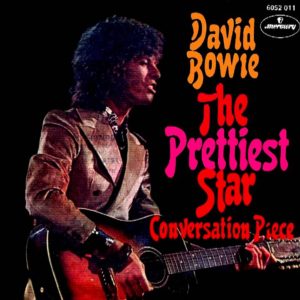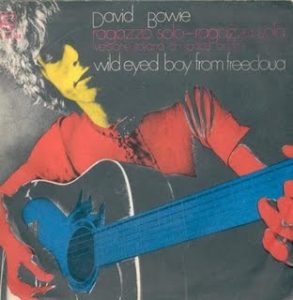| Essentials of the Era |
| “Space Oddity” “Unwashed and Slightly Dazed” “Wild Eyed Boy From Freecloud” “Memory of a Free Festival part 1” (single version) “London, Bye, Ta-Ta” (unreleased) |
This is the third in a series of posts following my listen to David Bowie’s entire catalog from beginning to end. Last time, I listened to Bowie’s treacly full-length debut and discovered several gems (that were not on the album).
David Bowie’s 1969 had an auspicious start – while he recorded an ambitious promotional video to try to generate new label interest he simultaneously ended a serious relationship (perhaps during the actual filming). However, it was something that had happened just before those events that would define his year and even his entire career.
That something was his penning a song called “Space Oddity.”
Before Space Oddity – Early 1969
 Early demos of “Space Oddity” from spring of 1969 show it had all the fine skeletal structure that makes it an arresting performance even today – the countdown, the layered “ground control” vocals, the drifting out in a tin can, and the extended break. A notable early demo features a live duo performance with Bowie handling the countdown himself. Yet, this tune was admittedly another curio – a gimmick song coinciding with increasing attention on the space race. Just as Bowie’s debut album couldn’t be shaped entirely around the theme of a giddy gnome, “Space Oddity” couldn’t set the theme for the rest of its record alone.
Early demos of “Space Oddity” from spring of 1969 show it had all the fine skeletal structure that makes it an arresting performance even today – the countdown, the layered “ground control” vocals, the drifting out in a tin can, and the extended break. A notable early demo features a live duo performance with Bowie handling the countdown himself. Yet, this tune was admittedly another curio – a gimmick song coinciding with increasing attention on the space race. Just as Bowie’s debut album couldn’t be shaped entirely around the theme of a giddy gnome, “Space Oddity” couldn’t set the theme for the rest of its record alone.
After the recording of the LP but shortly before its release, Bowie appeared on the BBC for a three-song set. Only “Unwashed and Somewhat Dazed” saw radio play at the time, although the session’s other two songs were released on Bowie At The Beeb.
“Unwashed” has a similar feel to “Space Oddity” to start, with major-to-minor guitar strumming and chiming high electric guitars. It transforms into something much heavier as the band enters, thanks to a big, rubbery bass and forceful drumming. There is not an obvious hook, yet it’s more enjoyable than the entirety of his debut. “Let Me Sleep Behind You” is more driven than the original recording, but that beat pushes too quickly past the distinct melodic hooks on the “let your hair hang down / wear the dress your mother wore” refrain. “Janine” has an southern-rock feel to it, with Bowie even effecting an American accent.
The sound of this session is much hipper than Bowie’s previous incarnation. However, the band still had not found any special alchemy together, despite their time in the studio.
“Space Oddity” b/w “Wild Eyed Boy From Freecloud” – Released July 11, 1969
 “Space Oddity” is a singularly peculiar song. Everything about it is peculiar, from it’s slow fade up and wheezing stylophone, to its measured countdown leading to liftoff, to it’s insistent lack of choruses. David Bowie told many fantastical stories in the songs of his debut LP with Deram, but none so dramatic or immediate as this one. It’s the little touches that make it memorable, like the love to his wife and the oscillating flutes behind the “sitting in a tin can refrain.”
“Space Oddity” is a singularly peculiar song. Everything about it is peculiar, from it’s slow fade up and wheezing stylophone, to its measured countdown leading to liftoff, to it’s insistent lack of choruses. David Bowie told many fantastical stories in the songs of his debut LP with Deram, but none so dramatic or immediate as this one. It’s the little touches that make it memorable, like the love to his wife and the oscillating flutes behind the “sitting in a tin can refrain.”
This single had the great fortune to see release less than two weeks before man first set foot on the moon. After a series of failed singles and a flop of an album, David Bowie was finally gaining notice. Yes, it was on another song that could be accused of being a novelty, but this one thankfully did not include laughing gnome. While the song was not a hit in the US, it reached the top five in the UK.
The B-Side is an early acoustic guitar and cello take on the fantastical “Wild Eyed Boy From Freecloud.” It is missing its first verse and orchestral accompaniment to truly set up its scope and drama, but this version (which went long unearthed until seeing release in the Sound+Vision box set) is simply an astounding performance. I’d hold up Bowie’s “really you, really me” refrain here as one of his finest vocals of all time, and the cello has many intricate little passes to suggest the motion of the later version.
David Bowie AKA Space Oddity – Released November 4, 1969
For as many people who know “Space Oddity” today, few have heard another song from David Bowie’s redebut, which was later rechristened in name of its one hit – more massive in later years than it had been at the time.
The only other single from the album is the peculiar “Memory of a Free Festival,” which bookends the disc with “Space Oddity.” It starts dirge-like, thrumming on a lone electric organ, perhaps an elegiac memory of the recent-passed summer of love.
We claimed the very source of joy ran through
It didn’t, but it seemed that way
I kissed a lot of people that dayOh, to capture just one drop of all the ecstasy that swept that afternoon
To paint that love upon a white balloon
And fly it from the toppest top of all the tops
That man has pushed beyond his brain
Satori must be something
just the same
 In a tangle of noise, a refrain emerges: “The Sun Machine is Coming Down, and We’re Gonna Have a Party.” Eventually a chorus of voices swallow Bowie’s vocal until it disappears, and all that is left is the chorus, a fuzz bass, and a ponderous drum beat, which too fade until we are back to Bowie himself beating on his tiny toy organ.
In a tangle of noise, a refrain emerges: “The Sun Machine is Coming Down, and We’re Gonna Have a Party.” Eventually a chorus of voices swallow Bowie’s vocal until it disappears, and all that is left is the chorus, a fuzz bass, and a ponderous drum beat, which too fade until we are back to Bowie himself beating on his tiny toy organ.
It’s weird, evocative, and remarkable in almost the exact same way as “Space Oddity” despite the two songs having nearly nothing in common other than appearing on the album together. Both are perfect frames to peer through to see a specific person and place, even though this one does not have a primary character or even tell a narrative story. Despite the music not being very interesting or catchy up until the refrain, “Festival” is distinct and memorable.
This is the unique power that Bowie had found, seemingly from the ether, in the two years since his last release. While that album is full of story songs, none of them set a precedent for the sudden raw power of Bowie’s inventive song structures and arranging. What might we credit for this transformation? Was it simply the music that surrounded Bowie in the popular culture of the day? Was it his future wife Angela? The team at Mercury Records? Did he “Join the Gang” he warned us about on that last record, merrily running alongside “London Boys” until he was ragged and sick from the pills?
The album that stands between the bookend singles is fascinating because that very identity struggle is on display across its length. Bowie vacillates between respectable young man, member of an art movement, and an untrustworthy longhair. He takes that last role on the would-be single, “Unwashed and Slightly Dazed.” It’s a scorcher – a bluesy stomp about stalking around the house of a pretty upper-class girl. It begins disguised as another “Space Oddity” with minor chords abuzz on Bowie’s twelve-string, but once the pretty girl looks down her nose at Bowie it explodes into rock. It blends in themes of class warfare with hallucinogenic imagery. “Unwashed” wears the vocal stamp of Dylan, the contemporary influence of the Stones, and could neatly serve as prelude to Jethro Tull’s tramp in “Aqualung” two years later.
I’m a phallus in pigtails
And there’s blood on my nose
And my tissue is rotting
Where the rats chew my bones
And my eye sockets empty
See nothing but pain
I keep having this brainstorm
About twelve times a day
So now, you could spend the morning walking with me, quite amazed
As I’m Unwashed and Somewhat Slightly Dazed
There is more poetry and sheer lusty power in a single verse of this song than on Bowie’s entire last album, so it can be forgiven for an over three-minute funk breakdown that inexplicably brings in a horn section before the end. It’s hard to believe no one pushed for it as a single (perhaps in an edited version).
“Letter To Hermione” is a folk song with a slight jazz influence that feels more of a piece with Joni Mitchell’s Clouds, released the same year. The theme of an unrequited love letter might have fit better on Bowie’s debut, but the texture of multiple acoustic guitars adds new depth to Bowie’s repertoire. It’s unfortunate that he acquires a frog in his throat at the midway point, as prior to that it’s one of his prettiest vocals. Despite lacking a traditional hook, the refrain of “I’m not sure what I’m supposed to do” clings after each listen.
“Cygnet Committee” is Bowie going full 1969, complete with backwards guitar. It starts out a soundalike to “Dear Prudence,” with a stepwise descending bass with a a tremendous vocal performance from Bowie. Yet, this isn’t another love letter, nor is it a lusty blues. This is one of Bowie’s first dystopian song stories (“As a love machine lumbers through desolation rows, plowing down man, woman, listening to its command, but not hearing anymore”), complete with an uplifting ending refrain that presages “Rock’n’Roll Suicide.” It still stands as one of his most complex epics. Unfortunately, the ring of adolescent petulance still clings – it reads like the spiteful goodbye letter to an ungrateful school club (and, in fact, was likely about Bowie’s disillusionment with the Beckenham Arts Laboratory he helped to found). Yet, there’s just not enough fuel for this one – the petulant lyrics in its buildup deflate what should be a victorious ascending climax emerging from the serpentine structure spread across its nine-minute length.
The one other fine specimen here is “Wild Eyed Boy From Freecloud,” which finds Bowie in the same fantastical mode as “When I Love My Dream” from his debut. Yet, “Freecloud” is not just a neutered love song, but a fantasy epic about a messianic young boy who is embraced by nature just as his village rejects him. It is magnificent in scope, switching from orchestral Disney musical to glam rock, stopping for a cartoon-climax worthy refrain of “It’s really me, really you and really me.”
“Freecloud” could easily be expanded into its own rock opera – there’s enough thematic content there for an entire album. In fact, it’s eerily similar to “Ziggy Stardust.” Sure, Ziggy didn’t live in a Henson-esque fantasy world, but he was another of Bowie’s messiah figures who was briefly a savior until the kids consumed him and his sweet hands were crushed. TO get from here to there Bowie simple switched the fantasy to sci-fi and brought his fictional Christ to down to earth – plus squeezed him into a more-traditional AABAB song structure.
Among the remaining chaff is “Janine,” not transformed much from its live debut on BBC radio; the sappy, flute-tinged “An Occasional Dream;” and a Dylan-influenced, finger-picked protest-song “God Knows I’m Good” (“the cash machines were shrieking on the counter”). These weaker songs are the puzzle of this album, and not just for their weakness. You can feel Bowie trying to find his voice, and these songs are remnants of some sensitive in-between phase we missed – the one that swallowed up his lovely debut B-side, “Let Me Sleep Beside You.”
There was probably one whole, good, folk-tinged rock album in Bowie in this time period – one that could give context to “God Knows I’m Good,” where “Letter To Hermoine” could be a rightful centerpiece, and where “Janine” could have teed up the meltdown of “Unwashed and Slightly Dazed” on a follow-up record. That might have been an album that yielded great commercial success – but we all had the misfortune to miss it.
It’s probably better for his career that we got this instead: an uneven album dotted with weird narrative monsters that feel doubly strange when held against the slighter songs in their midst.
 “The Prettiest Star” b/w “Conversation Piece” – Released March 6, 1970
“The Prettiest Star” b/w “Conversation Piece” – Released March 6, 1970
There are several intriguing elements of this single.
First, it’s not on the album – having been recorded in January 1970. Second, it features Marc Bolan of T-Rex on lead guitar.
Third, this recording of the song is not the one you’re thinking of – most Bowie fans are familiar with the version from Aladdin Sane. This early version is too disarmingly pretty, with its twinkling chimes, compared with the more sour-sounding later cut. Still, the fine quality of Bowie’s songwriting shows through – this cannot be compared to anything on his debut, or even the more forgettable songs on Space Oddity.
B-Side “Conversation Piece” is a stumbling monologue that would have felt more at home on the prior album.
“Memory of a Free Festival Part 1” b/w “Memory of a Free Festival Part 2” – Released June 12, 1970
In a peculiar move, Bowie’s record company passed over “Unwashed and Slightly Dazed” to have Bowie re-recored this odd pick of a single. I can’t help but think they had become enamored with the idea of him as a gimmick singer at this point, although that begs the question why they didn’t run with “Wild Eyed Boy From Free Cloud” (and then from there directly to the bank).
Granted, this recording carries a bit more structure and kick, overlaying an acoustic three-piece, Mick Ronson’s Bowie guitar debut, and spacey Moog synthesizer. Together, it brings the song much more in line with “Space Oddity.” It’s downright anthemic. Also, for purposes of 45rpm single length, it splits the majority of the “Sun Machine” section into a second cut.
Even if it wasn’t much of a success, I’m happy we have this version for comparison and posterity. Score one for the A&R guys, I guess?
Other Space Oddity Era Material
 Bowie committed a rocking update of “London, Bye, Ta-Ta” to record in January 1970 but passed over it to make “The Prettiest Star” a single. He probably should have gone with “London,” because’s it’s a knockout. It has the queazy style mash-up quality of his Young Americans work, evoking that same plastic soul feel. Particularly, the “I loved her” refrained backed by a cooing girl group is fantastic.
Bowie committed a rocking update of “London, Bye, Ta-Ta” to record in January 1970 but passed over it to make “The Prettiest Star” a single. He probably should have gone with “London,” because’s it’s a knockout. It has the queazy style mash-up quality of his Young Americans work, evoking that same plastic soul feel. Particularly, the “I loved her” refrained backed by a cooing girl group is fantastic.
(There’s also cleaner mix without the phased vocal effect, but it might be a little too normal, you know?)
“Space Oddity” was repurposed as “Ragazzo Solo, Ragazza Sola” – “Lonely Boy, Lonely Girl” – for single release in Italy to ward off bands covering Bowie’s hit. It’s performed to the original “Space Oddity” track, but the song is completely different! Not only is it not at all about an astronaut, but there are different combinations of voices and uses of harmony. I can’t comment on Bowie’s performance in Italian.
Bowie provided music for a piece of theatre called Pierrot in Turquoise or “The Looking Glass Murders” that was later broadcast on BBC. The recordings included an all-organ version of “When I Live My Dream,” the manic “Threepenny Pierrot” played on a ragtime piano to the tune of “London Bye Ta-Ta, plus two new songs. “Columbine” is an acoustic ode to the traditional leading lady of commedia dell’arte, while “The Mirror” bemoans the simple and foolish Harlequinn. The latter is quite a lovely bit of poetry, especially if you know your dell’arte archetypes:
Wash your face before your faded make-up makes a mark
The mirror will watch over you
Pierrot never comes so pack your face and chase the dark
The mirror’s hung up on you
Don’t be last, your friends and your reflection
It’s all so direction now
Poor harlequin, you’re quite an exception
Fay troubadour, on a downer
Gay harlequin, doesn’t believe in you
Doesn’t believe it’s true, such a downer.
An alternate mix of “Wild Eyed Boy From Free-Cloud” plays down the rock elements – it’s good, but not as great.
##
Despite a brief breakthrough, Bowie entered 1970 much in the same position as he began the prior year despite considerably more acclaim for his second David Bowie than he’d received for his first. However, the process of playing behind this album netted him Tony Visconti, who would produce both his next LP as well as many later-in-life albums, and the kinetic guitar playing of Mick Ronson.
As for the alchemy they summoned together on The Man Who Sold The World, you’ll need to await my next post.
[…] locked into an album-a-year rhythm he would maintain for nearly the entire decade as he left behind his more folk-influenced sound on Space Oddity and prepped material for The Man Who Sold The World. With this increased pace come necessarily […]